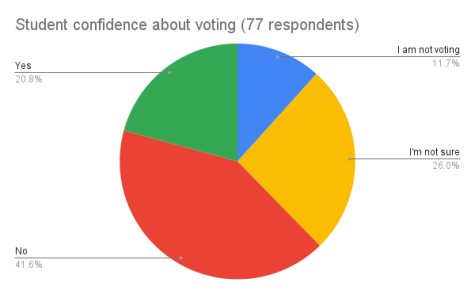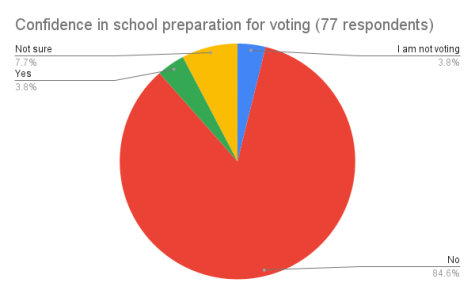Only 20.8% of students believe they can make an informed vote in upcoming elections
October 10, 2022
Carnegie seniors are becoming eligible to vote in the governor elections in Texas, which will happen on November 8. Yet, according to a survey on political awareness conducted by Upstream News, 68 percent of students realize that most of their knowledge about voting might not be enough to make an informed decision on the ballot.
Students who are U.S. citizens and will turn 17 and 10 months before November 8 are eligible to register to vote for the upcoming election. However, when asked if students feel confident enough about their knowledge on policies and candidates, 42 percent of students said no, 38 percent said they weren’t sure and only 21 percent said yes. Furthermore, 85 percent of students said that they believe that the school isn’t providing enough information about voting.

“The hardest part about voting for me is understanding what’s going on politically. I feel like if I voted right now it would be based on other people’s opinions rather than mine simply because I’m not informed on the candidates, political parties, et cetera. I guess if I watched and listened to the news more often or took time to do research, it would make voting easier,” senior Anna Fei said.
Fei’s response shows an indirect opportunity cost for young voters of learning about candidates that may prevent students from voting. To understand where students access political information, a poll was sent for students to take.
According to the survey, 79.2 percent of students looked at news articles, followed by 55 percent using Instagram and 53 percent hearing about it from friends. According to Fei, the friends and social circles around CVHS students can make the biggest impact on their decisions.
“Honestly, I don’t keep up with politics that often. I think partially because they are complicated and there’s a lot that goes into understanding them, but I also think it’s because I’ve never been surrounded by people who were very passionate about politics, so it never prompted me to look into them,” Fei said.
Senior Jake Wolff has also found that friends and social circles can be impactful on his decisions and views, as the majority of students share the same broad political views and stance yet may have different perspectives on individual topics.
“I don’t think it’s going to be a big surprise to anyone, but this is a pretty left leaning school,” Wolff said. “We all are pretty much on the same page politically. But it’s awesome because there’s so many people with different points of view and different backgrounds that come in and we may lean on the same side of the political spectrum but have a completely different view on this certain topic. And so, it’s opened my eyes to a lot of different schools of thought and things like that. Just because Carnegie’s so diverse and there’s so many people here that have varying opinions.”
When it comes to whether students think voting is easy and accessible, 51 percent said no, but Wolff thought otherwise. This was because he was being exposed to the voting process by his parents over time, an experience that other students may not have had. The habit of voting becomes easier as it is more frequently done. Students that have had exposure to voting more often may find it an easier and less daunting process.
“I would say voting itself is a pretty easy process. Although, take it with a grain of salt. I’ve never done it before. But signing up to vote was not difficult. And I’ve gone with my parents when they’ve gone to vote multiple times; you just show up to a local facility or wherever they host it and type it in on a machine. I think the hard part is getting educated on who to vote for, what you really want as a citizen, what is best for you, and what is best for your interests,” Wolff said.

Additionally, a basic knowledge of candidates and election dates is present among students. When asked which month the upcoming election was in, 21 percent of students responded saying that they didn’t know. Similarly, 25 percent of students could only name one or fewer of the candidates. However, registered seniors seemed to know basic information about the election.
“For this year, I know for the state governor, it’s Greg Abbott and I think the other main contender [is] Beto,” said Alex Deras, another senior who registered to vote. “I know there’s probably more, but I think the news kind of [over]takes it.”
As a response to the lack of confidence in accessible voting, Carnegie junior Bela Jotwani came up with a solution with the MyVoteProject.
“The main goals of the project are just to spread voting awareness and make voting and resources related to voting more accessible to the general public, because a lot of times people don’t know where to find information about their candidates, or what laws are being passed in their region,” Jotwani says.
The MyVoteProject targets easy, accessible ways to gain information and is making a difference in other states. Jotwani’s goal is to make the same happen in Texas.
“It doesn’t have a huge Texas section, but [it does] in other states such as New York and North Carolina. People can stay more knowledgeable [with] the [MyVoteProject] website as a resource before they’re voting,” Jotwani says. “People will put up QR codes near voting booths, which are called ‘cool sites.’ And then people will look at it on the way to the voting booth. And they’ll scan the QR code.”
On the ballot this election term, current Governor Greg Abbott is running under the Republican Party and candidate Beto O’Rourke is running under the Democratic Party. Candidates running under other parties include Delilah Barrios, Mark Tippetts, Jacqueline Abernathy and Mark Goloby. The last day to register to vote is October 11, and Election Day will take place on November 8.
“Carnegie has a lot of young voters and, although it’s high school… Only a small portion of the population is 18 and able to vote. It’s important for people who are not 18 to also participate in political processes because it affects them too. So, by encouraging people to volunteer for the project, even if they’re not ready, it encourages them to be more aware of voting [and] make a more knowledgeable vote and impact,” Jotwani said.
This story was originally published on Upstream News on September 23, 2022.



































